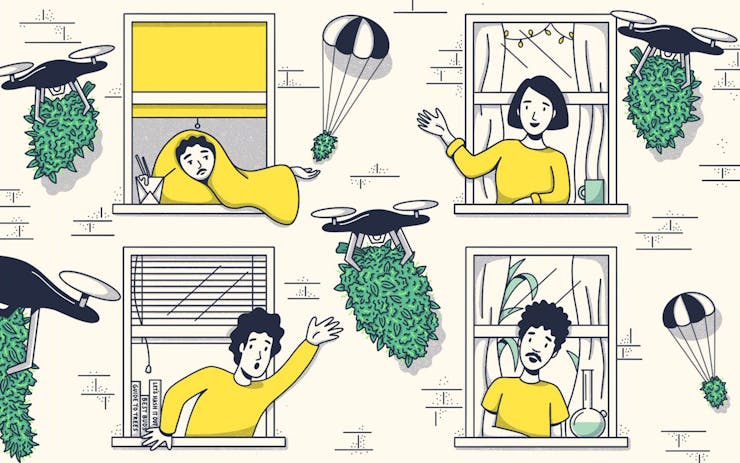There’s been a spate of recent speculation about the role drones might play in future cannabis deliveries. The issue resides precariously at the intersection of modern technology, ever-evolving and ever-confusing legislation, and a cannabis industry booming in all directions. Plus, there’s no denying the fact that drones filling the skies with Purple Punch and Sour Diesel is the stuff of so many futuristic fantasies. But is it possible?
As the demand for cannabis steadily grows, so does the need for efficient delivery from business to business. Currently, the sector favors privately-owned van fleets like those utilized by Sasquatch Logistics in Washington.
“We fill up an entire Sprinter van full of product, about 500 cubic feet of volume inside,” said Brian Thompson, who began Sasquatch Logistics with his brother in 2017. “We’re going to Spokane about three times a week, then down to Vancouver, up to Port Angeles. We’re covering the entire state of Washington.”
Fleets like these not only travel great distances to deliver cannabis, but they also carry the cash that cannabis companies can’t put in the bank. As a result, there’s more risk and overhead than with, say, a commercial delivery business transporting pallets of textiles or food.
“Since pot is still illegal under federal law, the industry is largely shut out of the federally regulated banking system. This means most legal cannabis businesses often have thousands, sometimes millions, of dollars in cash and product on hand. Cannabis needs to get from warehouse to retail store. Cash needs to be transported from stores to private vaults, to the handful of state-chartered credit unions that will work with cannabis businesses, and to local IRS offices,” reports Quartz.
Hence, cannabis delivery vans must be outfitted with safety and security modifications. According to Business Fleet, delivery van mods—like elaborate camera systems and GPS tracking—can cost companies upwards of $30,000 in addition to the cost of the van itself. Insurance costs are hefty too. Jesse Parenti, a director at Nine Points Strategies, a risk management service for cannabis companies, told Business Fleet, “a standard cost of insurance for most businesses in any industry is 0.5% to 1.5% of total revenue, which can be sticker shock for a cannabis company just starting out.”
At Sasquatch Logistics, its these sorts of delivery-by-vehicle costs that account for the bulk of their investment.
“Obviously, having a vehicle there’s a lot of expense that go with it,” said Thompson. “You have to pay for someone to drive it, there are a lot of taxes, LNI, and then gas expenses on top of that. There’s the wear and tear on the vehicle. [There are] a lot of little costs that add up quickly.”
And yet, Justin Costello, CEO of Bellevue-based company GRN Holdings, insists that people like Thompson are being “aggressively overcharged.” In response, GRN Holdings acquired a new drone cannabis delivery technology that they think “could eliminate 90% of costs” for cannabis delivery companies like Sasquatch Logistics.
Where the drones come in
Costello says the technology, IP, and drones GRN Holdings acquired from Bellevue, WA-based company Squad Drone, represent the most cost-efficient cannabis delivery system.
Shop highly rated dispensaries near you
Showing you dispensaries near“We’ve been in the industry for a while and we’ve seen the inefficiencies that transportation has brought to the industry, from Sprinter vans to insurance charging three times the market rate, or the fact that you have to pay people quite a bit of money to deliver [and] vans that sit in traffic for hours on end in places like Seattle or San Francisco,” said Costello. ““[All] this hikes up the costs [of delivering cannabis] more than two to three times than for an average deliverable … We saw an ability to purchase this technology that’s definitely a market disruptor.”
GRN Holdings commissioned Squad Drone to design a proprietary fleet of search and rescue drones for secure and safe cannabis delivery. Each drone has the capacity to carry either 20 or 40 kilos (roughly 44 or 88 pounds) of cannabis product for a weight-dependent distance of about 10 kilometers. Also, the entire fleet is outfitted with GPS, a digital signature interface controlled by iPad, as well as the CannaTrac payment system for closed loop payments upon delivery—an application that integrates with both producer/processors and retailers, according to GRN’s press release.
The addition of GPS helps ensure cannabis deliveries do not cross state lines, and closed loop payments allow for the direct and secure transfer of funds—which is always a concern for a cash industry. All applicable licensees are inputted into the app, with a photo of the recipient’s face and ID, to verify that the deliveries are received by the correct personnel.
“We are business to business [only], and the inputted managers of the store or producer/processor will be the ones on file and [the drone] will require the standard operating procedure prior to the tote being released and unlocked with a code, [and] issued to them,” said Costello.
Along with hypothetically being able to have more drones in the air than vans on the ground, this method will be cheaper, faster, and more environmentally sound overall because drones don’t need to be insured (there’s no commercial drone insurance out there yet, Costello says), they’re unmanned to help decrease extraneous employer costs, and the battery-operated drones reduce carbon emissions.
Ok, but is this legal?
GRN Holdings has successfully acquired the technology, but Costello is quick to point out he won’t be operating it—a step that will come with many “political” challenges.
Whichever company assumes responsibility for operating the drones will have to contend with the Federal Aviation Administration (FAA), as well as state, municipal, and city laws involving drone technology and of course, the legal sale of cannabis. Balancing all these moving parts seemed so complicated to regulate that the state of California just opted to designate cannabis drone delivery as illegal, according to Alex Traverso, Assistant Chief of Communications at the Bureau of Cannabis Control in California.
“I think [the idea of drone delivery] was more a too much too fast type of situation and [state officials were] questioning how difficult it would be to control,” he said.
'Our rules don’t preclude delivery by drone.'
As for Washington, Washington State Liquor and Cannabis Board’s (LCB) licensing rules make no explicit mention of drone delivery, even among the regulations for Marijuana Transport licensees in Washington State. Even so, LCB spokesperson Brian Smith is skeptical that the concept can withstand the scrutiny of the various regulatory bodies—particularly the FAA.
“Our rules don’t preclude delivery by drone. I mean, you don’t anticipate all the forms that travel may take into the future,” Smith said.
“I don’t know all the rules that govern delivery or commercial activity by drone, the FAA does that, [but] number one, they are a federal agency and it being an illegal product at the federal level there may be some issues there,” he said.
In fact, the FAA governs what can go in the air—and cannabis, as illegal in the eyes of the federal government, is not permissible. That’s why you can be stopped from boarding a plane with cannabis, even if you purchased flower in a legal state. Plus, even though commercial drones are unmanned, they are considered civil aircrafts and thus subject to the same rules as that of a commercial airliner.
Hence, federal regulations like 14 CFR 91.19 would likely send a cannabis-toting drone back down to earth: “No person may operate a civil aircraft within the United States with knowledge that narcotic drugs, marihuana, and depressant or stimulant drugs or substances as defined in Federal or State statutes are carried in the aircraft,” the legislation reads.
That grounding would likely be permanent, as well. Federal regulations also state that growing, processing, manufacturing, sale, disposition, possession, transportation, or importation of marijuana “may lead to the denial or revocation of pilot certificate applications and licenses”—thus voiding the drone operator’s right to fly the drone altogether.
There are additional complications to launching a drone delivery service that have nothing to do with cannabis. After all, Amazon’s drone delivery service, Prime Air, which is not looking at transporting cannabis products, has only just been approved for test flights after years of asserting that delivering packages by drone would “be in the public interest” by reducing wear on roads, lessening environmental impact, and further advancing unmanned aircraft technology, according to Washington Business Journal.
“The Seattle-based company is asking the U.S. Department of Transportation and the Federal Aviation Administration for several exemptions from federal law and regulations,” according to the Washington Business Journal. “Under updated FAA rules, the Secretary of Transportation is allowed to make such an exemption.”
Whether or not such an exemption could be made for these cannabis-delivering drones is another story, and only one of several roadblocks on top of the FAA.
There are also municipal and city ordinances to deal with. For instance, several counties in Washington State have ordinances around when and where drones can be used primarily to prevent accidents and espionage around government sites like SEA-TAC airport and Hanford Nuclear Site. In the city of Seattle, the main restriction is that drones cannot be flown in parks.
“Because of some serious accidents that happened with drones in Washington, including the crash into the Space Needle and the Pride Parade knockout in Seattle, you’re going to have a difficult time finding somewhere to legally fly in Washington,” Drone Enthusiast reported.
Where this leaves the drone idea
With all these airspace restrictions and drone ordinances piled on top of each other, and the number of regulatory eyes on the cannabis industry right now, clearly pulling off cannabis drone delivery will be an exceptionally tricky business. Still, Costello is optimistic.
“I believe our technology makes [transportation] safer, cheaper, and much more efficient… those are the main things that drive market disruption,” said Costello. “There’s obviously some political things like the FAA that we’ll have to work with, but we’re actually just the technology owners, not the operators, so we’re putting that off to the people that we license or franchise the technology to.”
'I just don’t see a drone being able to do it.'
Thompson is less enthusiastic, and not worried that these drone deliveries will challenge what he does at Sasquatch Logistics.
“The stuff we move is extremely heavy and large and [must] go so far away—we’re going to Spokane three times a week—I just don’t see a drone being able to do it,” he said.
Nevertheless, it’s a good time to keep your eyes on the sky. GRN Holdings recently signed a deal with an undisclosed operator, and Costello says the first cannabis drone deliveries are to set fly as early as March 2020.





